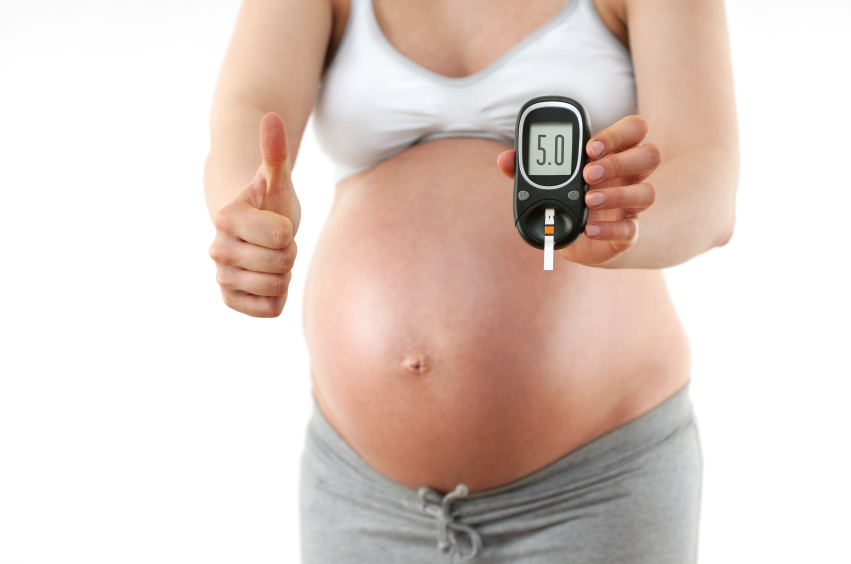Some Information About Gestational Diabetes

I’ve been noticing that a lot of my friends, family members, and acquaintances have been diagnosed with gestational diabetes recently. I started asking my mother and some of her friends if it was a “common” diagnosis when they were expecting, and the general consensus was that it was not. Which made me wonder why it seems so common now. So I decided to do a little research.
What is Gestational Diabetes?
The exact cause of gestational diabetes is not known. However, research points to the placenta as the culprit. Hormones from the placenta are critical for fetal development, but those same hormones can interfere with the action of the mother’s insulin in her body. Without enough insulin, the body is unable to convert glucose to energy, and the glucose builds up in the blood.
How is Gestational Diabetes diagnosed?
Most pregnant women have a glucose screening test sometime after the 24th week. Some women may have the test earlier if they are already at a higher risk for diabetes. Women at higher risk are those who are obese (or gain an excessive amount of weight early in the pregnancy), have a strong family history of diabetes, have been diagnosed during a previous pregnancy, have high blood pressure, or are over age 35. Unfortunately (or fortunately, depending on your point of view), there are usually no symptoms to indicate gestational diabetes, so the glucose screening test is important. It’s estimated that gestational diabetes affects approximately 18% of pregnancies, so if you are expecting – especially if you fall into one or more of the higher-risk categories – make sure your doctor orders this screening.
How can Gestational Diabetes affect my baby?
Gestational diabetes usually occurs later in pregnancy, after the baby’s body is already formed, so there is less instance of birth defects as a complication of the disease. However, the baby is still growing and developing. And the fact that the mother is storing glucose in the blood can lead to excess glucose crossing through the placenta to the fetus. The extra glucose will cause the baby’s pancreas to work harder to produce more insulin. Essentially, the baby is getting more energy (in the form of glucose) than it needs for normal development. This extra energy – just as it does in adults – turns to fat.
In addition to this extra energy turning to fat, and potentially causing the baby to have a high birth weight, babies born to mothers with gestational diabetes may have breathing problems, or be jaundiced at birth. They are also at greater risk of obesity, and of developing Type 2 diabetes as adults.
How can I control my Gestational Diabetes?
While diet is always important, and especially during pregnancy, planning well-balanced meals and snacks are critical in managing gestational diabetes. It is important to not skip any meals, to get the correct balance of protein, fats, and carbohydrates, and to avoid sugary items like candy and soda.
Exercise is also a must. Moderate exercise. Most doctors will prescribe 30 minutes of moderate activity each day - swimming and walking are good options. Again, you and your doctor should work together to determine the appropriate level of physical activity.
If your doctor finds that diet and exercise alone are not doing enough to control your blood sugar, you may require medication.
Will I still have diabetes after my baby is born?
It is possible. Approximately one-third of all women with gestational diabetes will still be diabetic after the baby is born. Additional testing is recommended between six and twelve weeks postpartum, to see if you still have diabetes. At that point, if you are still diabetic, you can discuss treatment with your doctor. Even if your glucose screening is normal at the six-to-twelve-week point, the American Diabetes Association recommends getting tested every three years.
If I had Gestational Diabetes, am I at a higher risk of being diabetic in the future?
Approximately one-third to one-half of all women who were diagnosed with gestational diabetes in one pregnancy will experience it again in a later pregnancy. And up to 50% of all women who have had gestational diabetes will develop diabetes at some point later in life.
Because of the risk factors, it is important to keep your weight in a healthy range. Make sure to eat healthy, avoiding excess sweets and empty calories. Breastfeeding your baby can also lower your risk of developing diabetes in the future, as well as helping you lose weight postpartum. And be sure to exercise regularly.
As with all things, it is important to discuss your health and the health of your baby with your doctor(s). Every person is different; every pregnancy is different; and every baby is different.
Jul 16, 2013
By: sharon













There are 0 comments for this entry. Leave a comment below »
Leave a comment. *Required